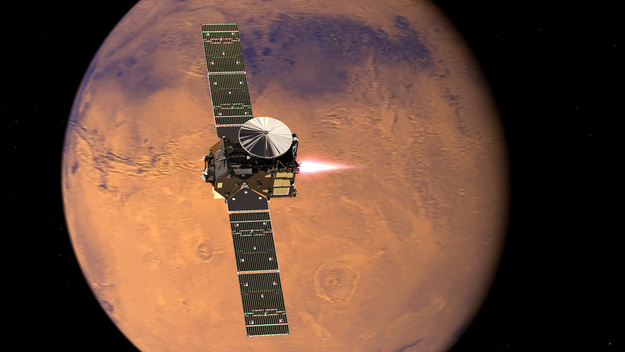
For the first time in the history of Mars exploration, now a team of Italian scientists have stated that they have found evidence of liquid water under the polar ice caps of the 'Red Planet.' Since the water is the most essential elements of producing life, now the science world has a hope to find alien life on Mars.
These scientists, who are working on the European Space Agency's Mars Express mission announced on Wednesday that the 12-mile wide underground liquid pool was detected by radar measurements near the Martian South Pole.
Even though the evidence is a bit indirect and required few assumptions, the scientists are now thinking about how to use those existing instruments, which are orbiting Mars to collect more data about that region and process further examinations.
Early collected data showed that most of the places in Mars have extremely low temperature, which is not ideal to support such liquid water but as reported by The New York Times the former chief scientist of the Italian Space Agency, Enrico Flamini, who also reviewed the research said during the Wednesday news conference that "Water is there."
In addition, he also said the finding showed that it was liquid and salty and also in contact with rocks. "There are all the ingredients for thinking that life can be there, or can be maintained there if life once existed on Mars."
Scientifically, in extremely low pressure the Martin atmosphere only could transfer the ice into a vapour, instead of making it liquid. But, in the study, which was published in the journal Science, scientists said that there is significant amount of underground liquid water, which is situated at a sufficient depth to create enough pressure to allow the salt to overcome the low pressure and as per the researchers, these circumstances helped to create both water and frozen carbon dioxide at the Martian pole. Similar water bodies were also found on Earth in Greenland and Antarctica where scientists have found microbial life, which is surviving under extreme and frigid condition.
Fred Watson from the Australian Astronomical Observatory, who has no links to this research project said, "This is a discovery of extraordinary significance, and is bound to heighten speculation about the presence of living organisms on the Red Planet. Caution needs to be exercised, however, as the concentration of salts needed to keep the water liquid could be fatal for any microbial life similar to Earth's."
After reviewing the data collected from the ESA's Mars Express orbiter, launch in 2003 which carries a ground-penetrating radar instrument called MARSIS, scientists now have some hints of finding water on the rough and dead planet.
The study clearly showed that MARSIS measures how the radio waves propagate and reflect back to the spacecraft. These reflections have provided the unknown information on what lies beneath the surface.
Director of the Centre for Astrophysics and Planetary Science at Cornell University, Jonathan Lunine, who was not involved in this research said that the recent finding transformed Mars from a dusty planet to a yet another ocean world of this solar system. He also added that more exploration on the red giant will make it a more complex planet.
As per the researchers, even though this is now cold, barren and dry, once upon a time, maybe 3.6 billion years ago, it used to have plenty of liquid water and lakes.
An associate professor at Swinburne University in Australia, Alan Duffy, who was also not the part of this research said that this stunning result has shown that "water on Mars is not a temporary trickle like previous discoveries but a persistent body of water that provides the conditions for life for extended periods of time.
If the liquid water pool is accessible, then it would help humans to survive on Mars in the future, as NASA is preparing to send explorers to the red planet in the 2030s.









